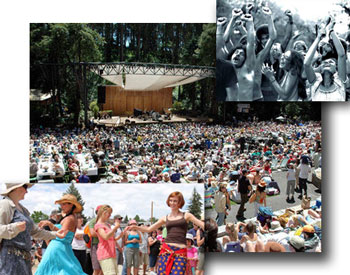
We are all women of a certain age—
at seventy, mine more certain than others’.
I’ve been somewhere much like this eons ago:
Love-ins, Be-ins, we called them then,
but the young girls in short skirts or long,
the couples, the children, the music: almost the same.
We filed down a steep, shady path,
orange nasturtiums lacing through dark ferns
on either side as if lighting our way
to where musicians are setting up
on a stage under tall redwoods.
On either side of us the earth angles up,
terraced to the west for seating on the ground.
We’re early, but every space is full, blanket to blanket.
The meadow beyond is a living quilt.
On an avocado square, two lovers lie
in one another’s arms, eyes closed,
blissful faces turned up to the sun
which has broken through the fog just now.
A circle of children and adults
make a center patch: a yellow ruffled skirt,
hot pink pants, a red shirt against the grassy field.
Two toddlers, boy and girl, hold hands
and do a wobbly, zig-zag waltz around the center,
binding it to the quilting blocks around, where girls in long skirts
and men in hats sit on the green.
On a rose patch, two babies sleep through
the Afro-Cuban afternoon, and when the music begins,
two dancers begin to twirl on the asphalt border:
she, shapely in black, a low-slung belt, and spiked heels,
and he, in baggy blue jeans, a T-shirt covering his sizable paunch.
If you couldn’t see them dancing together,
you might wonder what she saw in him.
A three-year-old runs the salsa gauntlet
between their legs as they sidestep and sway.
I think back to those gatherings in Golden Gate Park.
My husband John, gone these twenty years now,
danced like an angel too,
and he and I moved in the same easy sync,
with Kristy, two or three then, twirling between us.
Next to my friends and me, on a white patch,
a blind Asian woman, white-haired, frail,
kneels as she meditates or prays, head down.
Her tall son is her staff when she walks,
reaching up to hold on to one of his broad shoulders.
Our piece is tiny flowers on white, the quilt off Amy’s bed.
A yellow butterfly lights in my tipped wine cup on the grass,
takes a sip, and flutters on past paired dragonflies
and floating bubbles. Amy says it’s good luck for me.
On a blue patch a four-year-old
moves to the music in nothing but her lovely skin.
Two young men, laughing and tossing compliments,
follow a pare of pretty bare shoulders
down a path. As she smiles, I think one of them
will get lucky too. A baby in braids,
bouncing along in her mother’s arms,
stares fascinated at the stranger walking behind
as he waves and makes silly faces at the child.
Outside this green bowl rimmed by sequoia and eucalyptus,
wars—now, as then—take their toll; brain-damaged soldiers
beg on dirty city streets, children go hungry,
homes fall into foreclosure, and people lose hope.
But here, strangers offer champagne,
bountiful picnics are spread, children play,
and no one is poor, not even the lady scavenging cans—
she’s found a treasure trove.
And as for me, I make my way to the crowded floor
below the stage, and dance.

